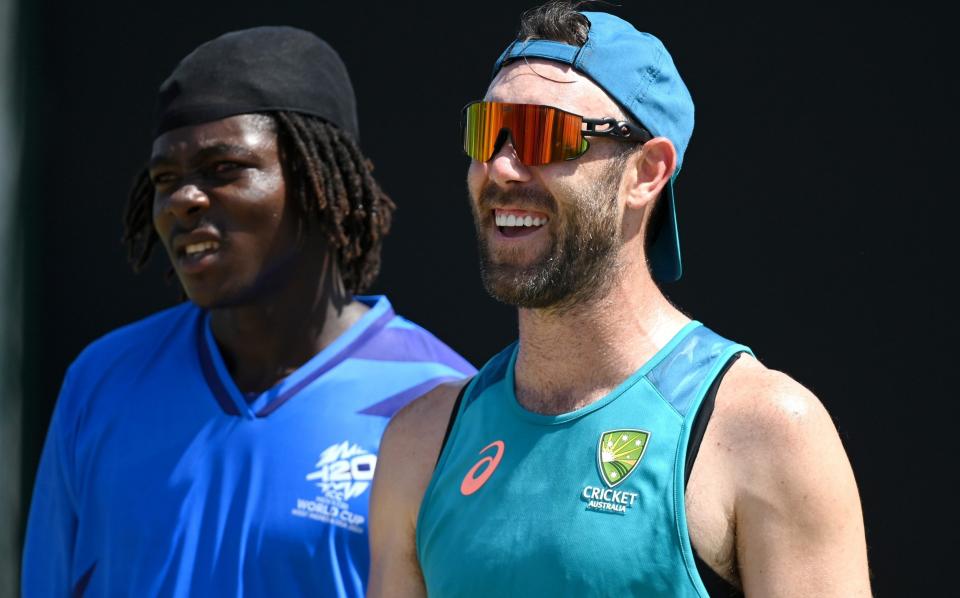Australia willing to rest players against Scotland in T20 World Cup match that can eliminate England

Australia are willing to rest their leading players for the game against Scotland on Saturday that is likely to determine England’s fate at the World Cup.
Australia can qualify for the last eight by beating Namibia on Tuesday in Antigua, giving them the luxury of rotating their squad for the final game and resting players before the Super Eights stage.
Andrew McDonald, the Australia head coach, did not rule out resting star names if they qualify with a game to spare. “We need a win to guarantee a way through. After that, once we’ve firmed up qualification, we can then look at that potential,” he said.
The Super Eights are determined on a pre-set seeding system (Scotland would just replace England if they go through) and teams do not carry net run rate through to the next round so there is no incentive for Australia to thrash Scotland.
“We’re not really focused on England and where they are at,” said McDonald. “England have clearly got their own work to do in their next couple of games. We were put in a similar situation in the last World Cup where we had to chase net run rate and it’s always difficult, depending on other results. But that’s for them to work through.”
A desperate situation
As long as Australia do not slip up against Namibia, and they have not lost to an associate at a World Cup since 1983, they and Scotland will go into the final match aware of the net run rate calculations required to knock England out.
It leaves England in a desperate situation and chasing net run rate to go through. They need an almost two-run swing to overhaul Scotland who thumped Oman on Sunday with 41 balls to spare to move to five points. Their net run rate is 2.1, England’s is minus 1.8. It is devilishly complex to work out beforehand and depends on batting first or second but basically England need to beat Oman and Namibia by 40-50 runs each time or knock off any target very quickly and hope Scotland take a bit of a hiding to Australia to sneak through.
England did not train on Monday, opting for a day off with a long break between Saturday’s defeat to Australia and their next match with Oman on Thursday.
It is likely they will stick with their six hitters rather than call up Ben Duckett because scoring runs quickly is crucial but Reece Topley is in line to return to the side, restoring the left-arm variation they so badly missed in Barbados. The wind can play a big part at the Sir Vivian Richards Stadium and England cannot afford to pick a similar attack again. “A lot of Caribbean Premier League players thought wind has a bearing on games here and that is real,” said McDonald.
Bowling first both times would simplify the complicated mathematical equations, when chasing teams can just go for the target like Scotland did against Oman. Playing such a way batting first is inherent with risk because too many booming shots could see England 45-5 in the powerplay and in danger of losing.
The importance of Archer
It would make sense if they do bowl first to use up Jofra Archer early so he can take as many wickets as possible to limit the target to one that can be overhauled quickly. No more Will Jacks in the powerplay please.
It is a weakness of the tournament that Scotland and Australia will play knowing exactly what they have to do to eliminate England. It is in both their interests to do so. For Scotland it obviously puts them through to the next round. For Australia it knocks out a rival that could go on a run and beat them in the final, unlikely as that may seem right now. Australia will know teams have squeezed through a group stage before to go on and win a World Cup.
Final group games in football tournaments are played simultaneously to prevent collusion after West Germany and Austria played out a 1-0 result at the 1982 World Cup knowing it would be enough for them both to progress to the next round.
But it is impossible to play the final games simultaneously in groups of five, which are ordered that way partly to satisfy the broadcasters who pay billions of dollars for ICC events, money that props up the nations outside the big three.
Instead, it is going to be a nervous Saturday evening for England, with the Scotland-Australia match the late game of the day starting at 8.30pm in the evening in Antigua, two hours after England’s will have finished against Namibia.
Point of no return
There is the horrible feeling for Matthew Mott that this World Cup is resembling the end of the Joe Root regime. That, too, came to a juddering halt in the Caribbean in 2022 with the team desperately in need of new ideas and an overhaul.
Exiting the Twenty20 World Cup at the group stage, knocked out by Scotland, would be a humiliation too far after the India debacle and surely end Mott’s two years into a four-year contract.
It will heap pressure on Rob Key, too, the director of cricket who took a punt on Mott based on his success with the Australian women’s team. Key flew home on Sunday after spending the first week of the tournament able to assess Mott and Jos Buttler at first hand.

